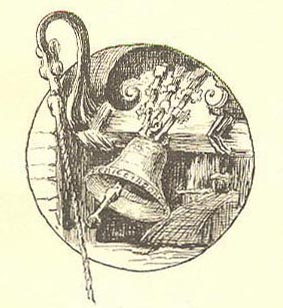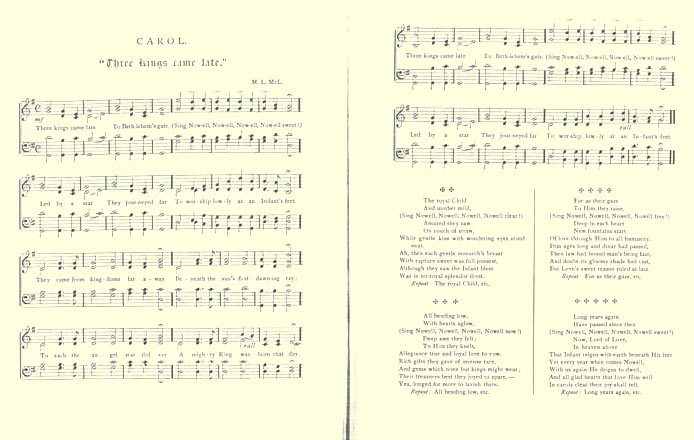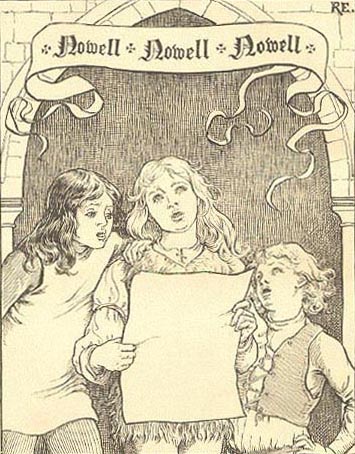 Three Kings.
Three Kings.
IN turning over annals of the days
When these few centuries of Christian light
Had numbered scarce a third their present sum,
I came upon a legend, simple, sweet,
Of how the message of the Christ-child found,
At Christmas-tide, three men of gentle will.
I write it that its fragrant breath may blow
On these incredulous days in which we live.
Though of your sharp-eyed faith it ask too much,
Your secret heart may own its freshening touch.
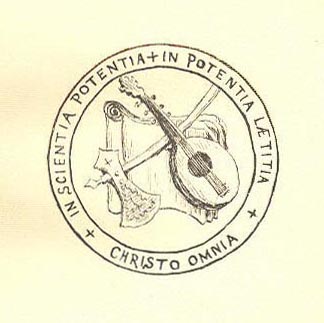 The Legend
The Legend
WHEN good King Arthur kept his circled knights
Strong riveted together by the power
Of his own blameless life and dauntless soul,
There sat at feast in hall, and rode with him
At need against the pagan's insolence,
A stately host of tributary kings,
Haughty to all beside; to Arthur, mild.
No vassals were they, groaning under yoke,
But noble monarchs, proud in loyalty
To Arthur, noble monarch of them all.
Fair were the clustered kingdoms, all aglow
With light of chivalry and knightood high,
Like jewels, various in their size and hue,
All set about some matchless diamond pure,
Each flashing, sparkling, beaming all its light
To enhance the brilliance of the central gem,
Which flashes, sparkles, beams, upon them all.
Thus shone the kings; and Arthur shone supreme.
'T was in a Northern realm–a forest land–
(Caerleon lying South some three days' ride),
That when the aged king was near his end,
He looked with love on his three loving sons,
And bade the eldest yield his birthright rank,
That in his kingdom three should reign as one.
Thereto the lawful heir, with sorrowing heart
So grieving for his dying sire that loss
Of sole dominion caused him scant regret,
Gave swift consent, and checked his brothers twain,
Who, with dismay, would bid him hold his right;
And the old king breathed out his life content.
Now when the younger brothers would disclaim
Their elder's strict fulfilment of his oath,
And held it but a soothing pious word
Spoken to ease a passing soul, unwise
In judgment upon fleeting earthly things,
In view of heavenly visions pressing close,
Then King Savain made answer calm and slow:
"Ah, brothers, in your nobleness ye urge
What in your nobleness ye would not do.
Our sire into the land beyond our sight
Passed smiling, with my plighted kingly word;
And none can solve me of its force save he
Who holds it, in that realm whence none replies
So rule we that our righteous royal vow
Be thrice as strong as mine, O just kings both."
So there they ruled in brotherly accord:
Their realm was large, their revenue secure,
And each gave loyal heed to each, and all
Were joined in compact for the good of all.
Their minds brought triple wisdom to debate;
Their three steeds bore three monarchs to the fight;
Their subjects rendered threefold loyalty.
Grave King Savain loved neither fight nor joust,
Nor quest of arms, nor feats of strength and skill.
In these and in all deeds of chivalry,
Succor of maid distressed or worsted knight,
Good record bare he for his hardihood;
Yet loved he better in a quiet hall
Or 'neath a spreading shady tree to sit,
Discoursing with some learned sage who came
By chance or with intent to their fair realm.
So when King Arthur at Caerleon held
At Pentecost his coronation feast,
Whereto he summoned all his kings to lend
Their noblest state to grace the pageant grand,
While sea-borne galleys thronged the noble Usk,
And stately chargers pranced in countless troops,
When in two minsters constant praise was sung
By chanting choirs of virgins and of priests,
From church to palace when the court returned,
And, seated at the feast, King Arthur bade
That of his kings and dukes the latest born
Should bring the viands to the elder peers,
While first he chose the royal brothers three
As knights most fit to serve his beauteous queen,
Then straight the whisper passed that King Savain
Came not with all the guests to banquet hall,
But sought the learned scholars of the place,
Who dwelt and studied there in still retreat,
By Arthur's royal will, unceasingly.
Nor in the feasts and games and routs that filled
Three summer days with mirth and noble sport,
Did King Savain appear; and Arthur said,
And smiled, that now the sages gray had proved
Fairer than beauty, mightier than power.
But King Savain's next brother, bold King Fors,
Rejoiced to mingle with the eager throng;
And where the weights were heaviest to throw,
And where the arrows sped on longest range,
And where the steeds most boldly leaped in air,
King Fors, the lithe, the strong, would boldly match
His youthful strength against the doughtiest knight.
King Joyant, gayest, fairest, youngest born
Of the three kings, was ever to be found
Where merriest flew the jest and rang the laugh,
Where sweetest sounded rote and lute and harp;
And damsels greeted him with welcome free,
And the fair queen was pleased right graciously
To call him near, so bright and gay his mien,
So charming was his fresh and buoyant youth.
Thus were they under summer's joyous sun
That straight above wooed flower and fruit to light;
But summer waned, and harvesting was done,
And autumn days and nights in lingering train
Passed on, and in their kingdom all was well,–
Their revenue secure, their tribute paid,
Their garners full, and all their realm at peace,
So firmly Fors held every foe at bay.
At yearly tournament the brother kings
Made welcome knights and ladies from afar,
And valiant joust gave place to splendid feast
Where dames and damsels flashed with gems and smiles,
And Joyant led and ruled the banquet's mirth.
But grave and studious still was King Savain,
Finding his highest pleasure in discourse
With poets and philosophers who came
Thrice cordial welcome in these halls to win.
Thus wise and brave and gay, their tranquil course
The kings pursued in concord brotherly.
What wonder if they recked not of the weal
Or sorrow of the rude and servile lives
That paid their tribute, filled their granaries, toiled
To make their banquets rich, their comfort sure!
It chanced on Christmas-eve the brother kings
Came riding slowly homeward, when the sun
Was near the hill-tops, which were soon to hide
Its warmth and radiance from the frost-bound land.
Above them creaked the bare and shivering boughs,
Shaken by wintry winds, and dry twigs snapped
Between the hard ground and their horses' hoofs.
Their well-stuffed doublets scarce were proof against
The sharp and angry thrusts of piercing blasts.
Nearing the chill and sombre forest's edge,
They spurred more blithely towards the sunny stretch,
And King Savain said, "Soon the convent wall
Will give us shelter as we ride beneath,
And breathing space unvexed by brawling winds."
Just then their chargers swiftly swerved aside,
And when the riders checked their pace and paused,
They saw from forest dimness forth emerge
What seemed three moving mounds of greenery,
Glistening with frost, and starred with holly red,
And dragging trails of misteltoe behind,
While, in dry leaves half hid, the groping feet
Of them who bore the loads could scarce be seen.
Then gay King Joyant spake, "Be these the sprites
That animate the groves, in sylvan guise
Disporting? Pray you drop your mantles green
And show the wild-wood forms that lurk beneath."
Then at the voice, and sound of horses' hoofs,
Down dropped the verdant heaps, and from behind
Their cold, damp loads, peered forth three peasant lads,–
Three slender, shy young things, in woven garb
That closely clung about their shapely limbs;
With flowing hair, and wistful eyes upraised
In still amazement at the great steeds' height
And restless strength, and their three riders' state,
But undismayed by Joyant's merry laugh,
Which clear and jovial rang, they stood and gazed.
"What do ye here, good lads, in all this chill?"
Kindly said King Savain. Silent at first,
Swift glances, furtive, timorous, they exchanged.
Then one upraised his fresh young face and spake:
"The priests in yonder convent let us come,
To gather boughs and vines and all green things
To deck the chapel walls for Christmas Day.
Good Brother Andrew tells us 't is the feast
When every hand should bring some gift to lay
Before the altar of the Christ-child fair.
We are so poor there's nothing we can do
But seek the fairest things that grow in woods."
"Where dwell ye, lads?" "Our parents live close by,
Down in the village by the convent walls;
But we dwell in the cloisters, serve the monks,
And learn from them to work, and pray, and sing."
"Come, child," said then King Fors to him who spake,
"Sure I must do my part for Christmas feast;
Give me your chilly load, and mount behind,
And I will bear you to the convent gate."
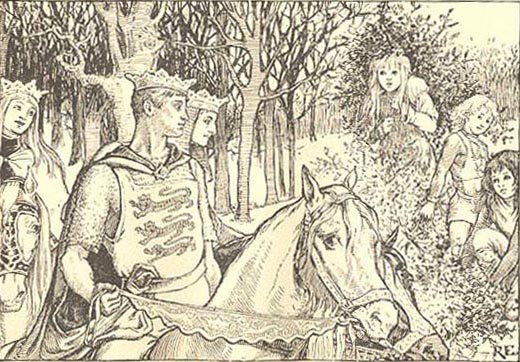
Then, stooping low, he raised the burden green,
And piled it 'gainst his charger's arching neck;
Then up he swung the boy, and bade him clasp
His brawny frame with all his slender force.
The other kings made haste their aid to give;
So 'neath unusual burdens pranced the steeds,
Bearing them through the convent gates, wide flung
In welcome at their royal lords' approach,
And crossed the echoing pavement, till they reached
The cloister's gray stone benches, mossed and old;
And there the lads abashed were lifted down
By priests that pressed wide-eyed, with hurried steps,
And voices quick to praise their gracious kings.
Then, as the boys bowed reverently their thanks,
And all the steeds were turned in act to go,
King Joyant spoke a sudden pleasant thought:
"Good Abbot, pray thee bid these youths to raise
A merry song upon the frosty air.
If but their voices be as fresh as they,
It needs must be a pleasure for us all."
Thereto the Abbot, giving glad assent,
Said, "Sing the carol Brother Andrew made
In honor of the season, for your kings,
Who graciously are pleased to listen here."
So, timidly, but with obedient will,
With eyes uplifted past their listeners all
Who in the cloister's sheltered stillness stood,
The monastery walls surrounding them,
Save on one side where still the sinking sun
Poured in a level flood of golden light,
The three fair peasant boys stood close, and raised
Their pure young voices in a song so clear
It seemed the setting sun must pause to hear.
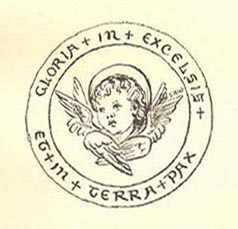 The Carol
The Carol
THREE Kings came late
To Bethlehem's gate.
(Sing Nowell, Nowell, Nowell, Nowell sweet!)
Led by a star
They journeyed far,
To worship lowly at an Infant's feet.
They came from kingdoms far away
Beneath the sun's first dawning ray;
To each the angel star did say
A mighty King was born that day.
The royal Child,
And mother mild,
(Sing Nowell, Nowell, Nowell, Nowell clear!)
Amazed they saw
On couch of straw,
While gentle kine with wondering eyes stood near.
Ah, then each reverent monarch's breast
With rapture sweet was full possest,
Although they saw the Infant blest
Was in no royal splendor drest.
All bending low,
With hearts aglow,
(Sing Nowell, Nowell, Nowell, Nowell now!)
Deep awe they felt;
To Him they knelt,
Allegiance true and loyal love to vow.
Rich gifts they gave of incense rare,
And gems which none but kings might wear;
Their treasures best they joyed to spare,–
Yea, longed for more to lavish there.
For as their gaze
To Him they raise,
(Sing Nowell, Nowell, Nowell, Nowell free!)
Deep in each heart
New fountains start
Of love through Him to all humanity.
Dim ages long and drear had passed,
Then law had bound man's being fast,
And doubt its gloomy shade had cast,
But Love's sweet reason ruled at last.
Long years again
Have passed since then,
(Sing Nowell, Nowell, Nowell, Nowell sweet!)
Now, Lord of Love,
In heaven above
That Infant reigns with earth beneath His feet.
Yet every year when comes Nowèll,
With us again He deigns to dwell,
And all glad hearts that love Him well
In carols clear their joy shall tell.
WITH earnest gaze the three kings heard the lay,
And gracious thanks and kindly parting said,
Then turned their horses' heads and homeward rode,
Musing in silence which no comment marred;
Yet each felt in his heart the holy glow
Of Christmas-tide, till then wellnigh forgot.
They hearing its sweet gospel yearly read
By reverend priests from blazoned missal-page,
In ancient tongue, but dimly understood,
Believed, yet were as though they heard it not;
On unperceiving hearts so idly fell
The glad evangel, like a pleasant tale,
Undoubted, yet exacting naught beyond
Belief, nor yet inwoven prayerfully
Into the web and texture of their lives,
Like glittering golden thread, to beautify
With frequent brilliance what were else but dull.
THAT night upon his couch lay King Savain,
And dreamed of wisdom, wonderful and rare;
And in and out of all his visions ran
A subtle harmony of voices clear,
As if the morning stars in concert sang,
With melody that rang so true and far
That to the sinking sun it seemed to reach,
And bid it stand to hear the chorus sweet.
Savain's grave face was lighted with a smile,
For even sleeping he was well aware
Of a new warmth that glowed about his heart.
He dreamed he knelt, one of three prostrate kings,
Before the Babe, Who tender, helpless, frail,
Yet with His holy gaze each creature's best
Seemed to compel, and in acceptance sweet
To sanctify and hallow both the gift
And giver. Now as King Savain beheld
How, lowly bending, his companions both
Laid gems, and gold, and costly spices down,
Each giving of his richest, rarest, best,
He felt a sudden pain that he alone
With empty hands had come. But his full heart
So loyal, loving beat that unashamed
He knelt, and said in glad adoring awe;
"All without gifts which hands can hold I come.
Of such possessed, I never prized them high,
Nor found in them my choicest treasures. Take,
Sweet sovran Babe, myself, and all I am,
To be Thy vassal, with my noblest powers
To serve Thee, gentle Wisdom from on high.
Thine hence shall be all knowledge I have stored
In selfish years; do Thou but consecrate
Its use, and make me truly, heavenly wise."
While King Savain still knelt with earnest gaze
Upon the Babe, the mother rose and placed
The smiling Infant in his outstretched arms,
'Gainst which dear load his beating heart did press
And throb with joy for all humanity.
Then, still in thrall of the sweet dream, he said,
"The Christ-child shall a worthier altar have
Than this too lately hallowed heart of mine;
I'll bear Him to our chapel-altar old,
Will throne Him there, and there will pay my vows."
So, stepping swiftly o'er the cold stone floor,
Through the dark corridors he took his way,
But dreamed he walked in green and flowery fields,
And that a light shone round more bright than dawn.
KING FORS, of war and peril wont to dream,
Of foemen vanquished, and the victor's joy,
Felt too the Christmas spell, and all the night
He fought, in dreams, to save from cruel foes
Three fair-faced boys, who needs must sing the song
That Brother Andrew made for Christmas-tide,
And hence were held, by pagans' fierce despite,
In dungeons deep, noisome, and damp and cold,
Whence ever rose their sweet and thrilling tones,
And Fors was fain to rescue them or die.
So, in his dream, warders before him fell,
Ay, and stone walls lay low at his approach,
Till soon he came where rang the wondrous song,
And there he found the song's inspiring Theme,
The Holy Child, the smiling Infant Christ,
Whom lifting in his reverent arms he bore,–
A blessed burden,–to the royal hall,–
Up to the altar in the chapel dim;
There would he throne the Babe and guard Him safe.
And round him as he walked fresh flowers bloomed,
And balmy airs and sunlight radiance played,
While sweetest melody incessant sang
Of peace on earth, where'er the Christ-child reigns,
Of love through Him to helpless, faint, and frail.
His mighty heart beat high with holy zeal,
Throbbing so close against incarnate Love.
KING JOYANT'S bed was silken soft, and there
He used to dream of all fair things and gay,–
Of pleasant pageant, music, beauty, mirth,
All gentle joys that art and nature yield.
This night he wandered in a garden fair,
Where flowers of every hue in beauty bloomed.
At first he found all faultless there and glad;
But soon he heard a gentle moaning sound,
Like plaintive wailing of an angel voice,
So faint, so sweet and tender, rose and fell
Its tearful murmur on the fragrant air;
And hasting on with beating heart, and eyes
All moist for pity of the soul-sad plaint,
He came where, in a verdant arbor's shade,
He saw a mother of angelic mien
Soothing a moaning Babe with gentlest care.
"Why is the beauteous Babe so sad," he said,
"Where all things else in summer's sunshine smile?"
The mother rested tender, piteous eyes
Upon King Joyant then, and answer made:
"The garden smiles because your glances gay
See but the beautiful where'er they range;
My Babe's clear vision sees, ay, and foresees,
How faded are His flowers, in this His world.
Behold, on every side how droop their heads,
How crushed 'neath ruthless foot the fairest lie,
While the sweet fragrance tells their tale of pain:
'T is this sad knowledge darkens His sweet life,
Presaging knowledge sadder as it grows."
King Joyant raised his eager eyes, and lo!
Where but a moment since his gaze had seen
Naught but the perfect flowerets in their pride,
Others he found, far more, that withering bowed,
And drooped their blighted heads; and broken stems
And faded blossoms seemed to fill the place,
So little recked he now of fair and fresh,
For pity of the bowed, and crushed, and bruised;
Yea, some he saw his own light foot had trod
Deeper into the tangle and the soil.
But still the Babe's low moan kept wailing on
With pathos that oppressed the gay king's heart,
So that he said in gentle, pleading tones,
"Ours is a stately castle, moss-grown, far
In a deep forest builded long ago;
Thither O let me swiftly bear the Babe;
His grief may cease when these sad flowers no more
Afflict His pitying eyes with constant pain."
Then rose the anxious mother fair, and laid
The Child most tenderly in Joyant's arms,
Nor showed she any will to follow him
As forth he stepped, bearing his sad, sweet load.
Now as King Joyant walked he marked that each
Down-trodden blossom raised its drooping head,
And bended stalks regained their stately height,
While every limp and wilted flower grew fresh,
And all about there seemed a breeze to blow
Of healing, life, and vigor. And the Babe,
Lying in Joyant's arms, hushed His sad plaint,
Spread forth His tiny hands as if to bless
The freshening land, and smiled a heavenly smile.
And Joyant knew it was the Christ-child wrought
This ministration blest of healing power,
And felt within himself a thrilling joy,
That he, the careless, gay, and jocund youth,
This favor found,–such precious weight to bear;
And, like the flowers, he felt the Babe's sweet might
Possess his being, in a new-found bliss,
Beside which all his worldly pleasures fair
Seemed hollow mockeries, and in his heart
Upsprang an earnest longing, joy to give
Of his abundance unto joyless lives;
But eager first to show his holy Guest
To his dear brother kings, he hastened on,
In his sweet dream, to reach the chapel old,
Upon its altar to enshrine the Child.
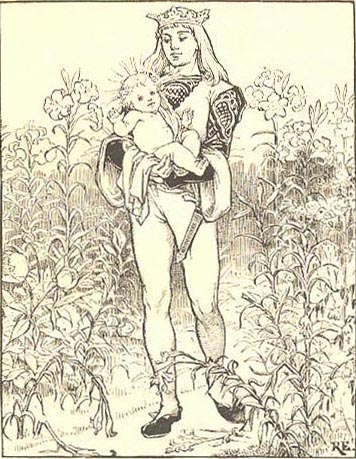
THUS through each dream the Christ-child's presence wrought
The self-same impulse in each loyal heart,–
To seek some holy place, where each might bow
And worship lowly at the Infant's feet.
But not as in a fleeting earthly dream,
Where fancy seizes and forsakes the will,
The quenchless fervor of the holy spell
Impelled each dreamer to the chapel dim.
There waking, each, from ecstacy of joy,
Became aware that close beside him knelt
His brothers, all in speechless wonder bowed;
For, to their waking sight, the holy Babe
Stood in a golden cloud of glory bright
Above the altar, while His heavenly smile
Beamed blessing on them humbly kneeling there;
And round about them angel voices sang,
Filling the air with sweetest harmony,
Which yet a heavenly echo seemed to be
Of that same carol Brother Andrew made,
In honor of the Christ-child's natal day.
Long knelt they there in bliss and thankful joy,
Till bright at length the morning sunlight streamed
In through the chancel-window, and along
The slanting beams, like golden pathway laid
Upward to heaven, the Christ-child seemed to mount.
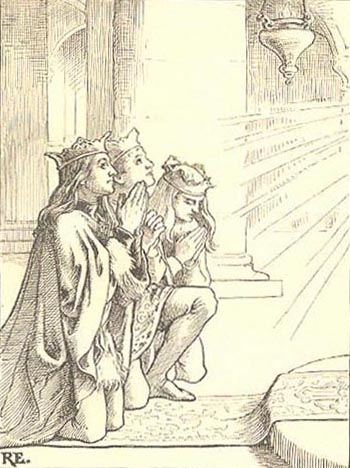
THEN rose the brothers three, and in each face
Wisdom and strength and joy most holy shone.
Silently grasping hands they stood awhile;
Then each with beating heart declared his dream.
And King Savain said, "Brothers, I have learned
That wisdom is of heart as well as mind;
That he is wisest who most consecrates
His wisdom to the raising up of those
Who in deep ignorance dwell, nor know how dark
Their sad estate, because they ne'er had light.
Mine be henceforth the task, with heart still warm
From the sweet Christ-child's touch, all wisdom true
And learning in our kingdom to diffuse,
That unto wiser hearts and gentler minds
In future years this holy day may come.
Christ grant me wisdom not to work in vain!"
THEN strong King Fors stretched out his mighty arms
And said, "My brothers, now, as ne'er before,
I bless our Lord for this great frame of mine,
Which until now has idly spent its strength
In foolish feats of arms and vain display,–
Perchance not fruitless, if they have made firm
My sinews, and a stanch endurance bred
For these hard tasks whereto I set me now;
For I will journey up and down our realm
Unearthing all abuse of weak or frail,
Till helpless and down-trodden folk shall know
That a strong arm and an unwearied eye
Guard them and watch them, for the Christ-child's love,
In Whose blest might my purpose shall prevail."
KING JOYANT, thoughtful more than was his wont,
Said gravely, "Mine own pleasure have I sought;
Have wantoned ever gayly in the sun
That shone about me, recking naught of shade
And hopeless gloom that compass other lives.
The drooping head, the wail, the tear, the groan,
Of hearts oppressed, I have not sought to cheer.
With the warm contact of the Christ-child's heart
A clearer sight was granted to mine eyes,
That grief and sorrow, wrong and woe they see;
Yet does my heart not quail, for it has stored
Such cheerfulness, in pleasant days of joy,
As now, by Jesu's love, shall be transformed
And sanctified to helpful, holy balm
Of consolation, for sad souls that sit
As beggars poor in hope and love and faith,–
Ay, poorer, for they know not where to beg.
To sorry hearts, sick souls, and dreary lives,
The Christ-child's cheer henceforth will I convey,
And Christ me help His joy at last to win."
ANDREW, the priest, the Abbot, sage and saint,–
A man both wise and pure beyond his time,–
Lived one long life of arduous labor first,
Then half a lifetime tarried in the flesh,
The reverend patriarch of the convent tribe,–
An angel, speaking tidings of his Lord,
Foretelling joys of Paradise to come,
Winning to love that sanctifies the life.
His were the annals which the convent kept,
Of all the godly acts of the three kings,
Savain, and Fors, and Joyant, whom he loved
And counselled, and whose holy lives he knew,
To whose good deeds their whole realm witness bore,–
Deeds clothed in lasting form, that still had force
When one by one the three kings laid them down,
And Father Andrew crossed their faithful hands,
Thanking his Lord Who sanctified their lives.
And while he lived he loved to tell the priests,
And all who flocked from far to hear his voice,
Their story, lingering long with solemn joy
O'er that glad Nowell when the Christ-child came
And won them to His service and His love,
Wherein they found true wisdom, strength, and joy.
